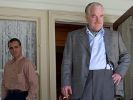Eye For Film >> Movies >> The Master (2012) Film Review
The Master
Reviewed by: Anne-Katrin Titze

Seconds into the film, The Master director Paul Thomas Anderson already has a firm grip on you. His tour de force picture references an entire Hollywood archive of Second World War and post-war movies without a single explicit quote, because the archive is in our common pool of war imagery, manufactured by cinema.
And then Anderson turns those expectations on their head, and gives us the private side of the coin - the memories of grandparents, the faded family photos of Aunt Doris from Norway, the representations of a presumed reality that always mingles with the shared movie memory.

In the beginning, there was water. The turquoise sea crests with white foam as watched from above, from a ship, perhaps. Then we see Joaquin Phoenix's head in a steel helmet, partly hidden, crouching in a boat. And the audience begins to anticipate. D-day? Omaha Beach? A battle at sea?
Instead, Navy men wrestle in play with each other on the shore, where they have constructed a sand maiden. More South Pacific (1958) with a hint of Suddenly Last Summer (1959), than Saving Private Ryan (1998).
And still, the terror of war and terror of his childhood is present in the wounded physicality of Phoenix's superb performance as Freddie Quell. Quell means spring, source, and a well in German, and is he ever true to his name. His element is the water, and all liquids are under his control. He pours and mixes (literal) killer concoctions out of anything he finds - paint thinner, photo developing liquids, petrol from the belly of a ship, creating cocktails that possibly only a true alcoholic might appreciate.
Quell's potion talent is noticed by Lancaster Dodd (Philip Seymour Hoffman, more nuanced and opaque than ever), called the Master by his disciples of The Cause, a movement partly based on Scientology, partly on other sects that promise salvation and spiritual enlightenments. Hoffman's Dodd is not a portrait of scientology founder L Ron Hubbard, although he is clearly and admittedly influenced by him, as well as by John Steinbeck.
The year is 1950, and as the relationship between the two men unfolds, power structures begin to shift. What on the surface looks like the depiction of a lost drifter with severe shell shock and tempestuous anti-social behaviour being taken in by a calm, innovative thinker and family man with a growing number of enthusiastic followers and wealthy supporters, turns into something quite different and much more fascinating.
Replace the voiced D-sound with a voiceless T-sound, and the Master's name becomes Tod, the German word for death. His realm is the desert. His method of questioning and healing has as its goal the mastery of human emotions, in past lives and the present one. "You are not an animal," he reminds Freddie, who at times behaves more like one than most characters you will see at the cinema, this year, or in your past lives.
Freddie turns out to be propelling the boat and peace needs much skill to survive.
Surrounding, supporting, and undermining the central love story, Paul Thomas Anderson paints unforgettable scenes that should be enjoyed in a rare 70mm projection. Cabbage leaves at harvest, the cool air while running over a pre-dawn field, the shiny red silk pajamas Dodd wears during his first talk on the ship with Quell, the American flag fluttering in the wind as the ship passes under the Golden Gate Bridge at sunset are the epitome of cinema's vigorous promise.
Amy Adams as Dodd's wife Peggy, a rosy-cheeked mother, pregnant again, dressed in super real 1950 maternity wear, is a woman in control. She sees everything, including her husband's unmastered desires. When in doubt, look at Peggy Dodd's motionless face, Adams will add an unexpected dimension to the scene. Laura Dern plays Helen Sullivan, who offers her Philadelphia house to The Cause, as an adoring devotee, tortured in her will to believe that the teachings are real and "trillions of years old", despite all contradictions and inconsistencies in message and method. Even Dodd's son says that his father is "making it up as he goes along". Dern's pained facial expressions are mirrors of what you see when you walk through the city with open eyes today.
Dodd's questioning of Quell gives a taste of The Cause:
Do you linger at bus stations for pleasure?
Do your past failures in life bother you?
Do you like to be told what to do?
Are you often consumed by envy?
When asked: "Are you lying?" Quell says no. To "Are you a liar?" He says yes.
In one of my favorite scenes, Quell works as a photographer in a department store. Anderson chooses a magnificent location: What looks like the high-ceilinged lobby of a bank or an art-deco insurance building is transformed into a calm, lofty dream of Fifties commerce. To go with this perfect temple of consumerism, Anderson chooses Ella Fitzgerald's velvet voice singing Irving Berlin's Get Thee Behind Me Satan, while a mannequin in fur whirls through the store, opening and closing her coat at the customers, breathing $49.95, the price of salvation. Freddie's photo experience comes in handy later, when he takes the publicity shots of Dodd. He poses and touches his moustache, and Anderson's direction seems to give a subtle nod at Heinrich Hoffman here, who was Hitler's personal photographer and styled his early campaign image.
Phoenix, Arizona, is where the first congress of the movement takes place. It is also the starting point of Hitchcock's Psycho (1960) and Joaquin's last name.
Peggy Dodd tells Freddie to place something in the future. "You can come and get it whenever you are ready."
Whatever he placed, we are living it now.
Reviewed on: 16 Sep 2012
















